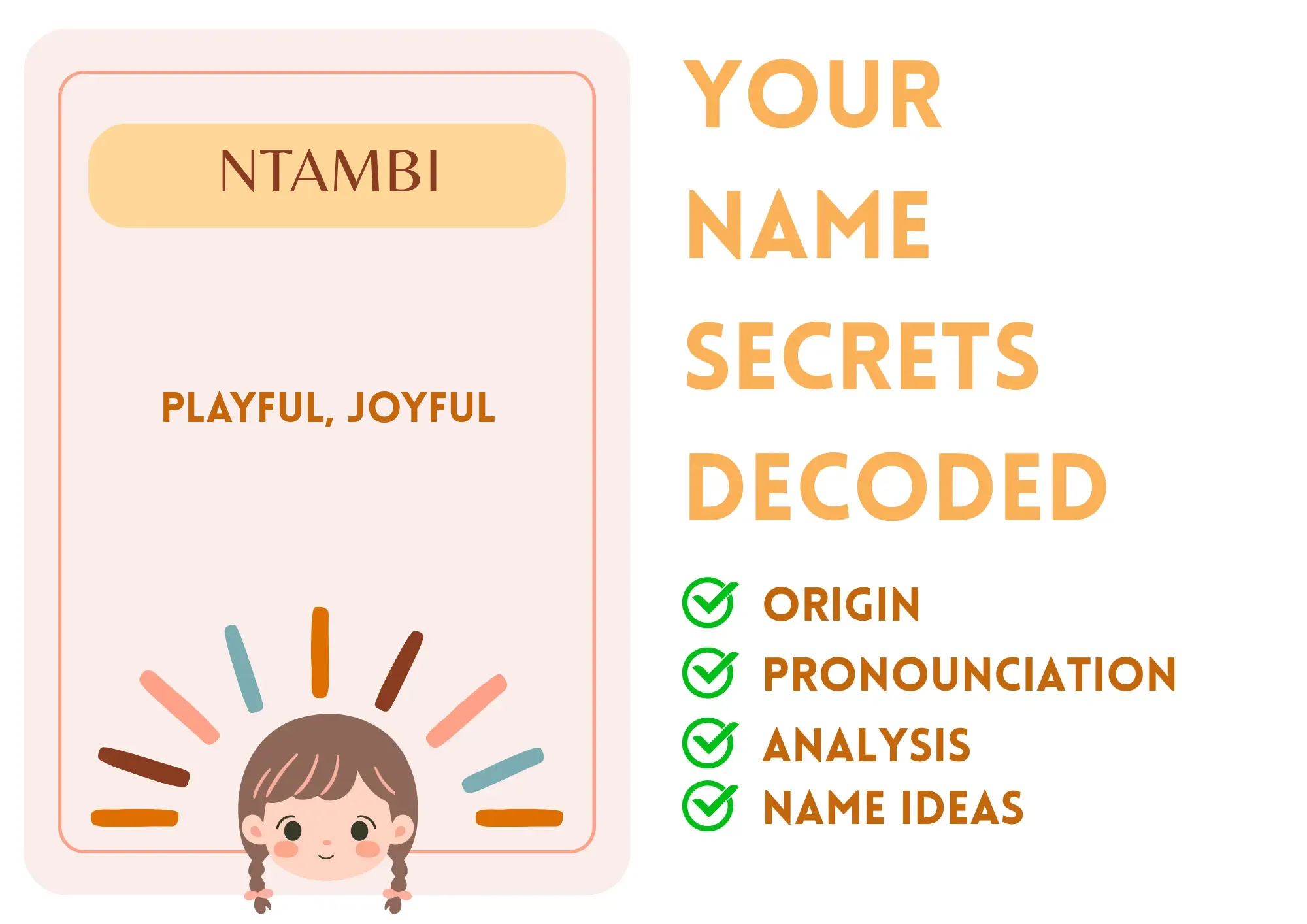
Ntambi
Ntambi is a beautiful name with African roots, often associated with the meaning 'to be playful' or 'to have joy.' Widespread in certain African cultures, it is primarily used for girls. The name is influenced by Bantu languages, where it encapsulates cultural values of joyfulness and play. The significance of Ntambi resonates with the celebration of life and positivity, making it a favored choice for parents who wish to convey happiness and playfulness through their child's name.
In many cultures where Ntambi is prevalent, the name is perceived positively, embodying warmth, joy, and approachability. It is easy to pronounce and write, making it a practical choice. Common nicknames include Tami and Nani.
The name Ntambi might not be frequently featured in global pop culture, yet it is deeply cherished in familial and local settings, symbolizing a sense of heritage and connection to joyful living.
Basic Information
Gender: Girl
Sounds Like: n-TOM-bee
Pronunciation Explanation: The name is pronounced with the emphasis on the second syllable, 'TOM', while the first syllable, 'N', is soft and connects to the final syllable 'bee'.
Summary and Meaning
Meaning: playful, joyful
Origin: The name Ntambi has its origins in African languages, specifically among Bantu-speaking communities.
Usage: Ntambi is traditionally a feminine name, representing joyous characteristics often associated with girls.
Name Number (Chaldean)
Name Number (Pythagorean)
Popularity (Global Rank)
Overall: 110596
Girls: 77177
Most Popular in
Religious and Cultural Significance
Religion: African Traditional
Background: In many African cultures, Ntambi carries significance related to ancestral traditions where names reflect attributes or virtues celebrated within the community.
Cultural Significance: Ntambi is appreciated for its joyful connotations, often chosen for children to symbolize happiness and the playful spirit celebrated in family life.
Historical Significance: While Ntambi may not have a documented historical lineage in ancient texts, its usage signifies important cultural values such as joy and communal celebration common in African societies.
Popular Culture
Literature and Mythology: Ntambi might not be widely recognized in literature but reflects the joyful spirit found in many African folk tales.
Movies and Television: Instances of the name may appear in African films or series, often associated with characters embodying joy, family, and cultural pride.
Feelings and Perceptions
Perception: Ntambi is viewed positively, carrying a sense of happiness and warmth. It evokes strong ties to culture and community.
Positive Feelings: Joyful, playful, warm, inviting, culturally rich.
Negative Feelings: Some may find the name unusual or unfamiliar, particularly outside African communities.
Practical Considerations
Ease of Writing and Calling: Ntambi is easy to write and pronounce. It consists of six letters and three syllables, making it memorable and straightforward.
Common Typos and Misspellings: Ntamby,Ntabi,Ntambi
Common Nicknames: Tami,Nani,Tammy
Ntambi Popularity
Ntambi Usage and Popularity By Country
| Country | Rank (Overall) |
|---|---|
| Uganda | 712 |
| Tanzania | 10770 |
| Norway | 27537 |
| Sweden | 31840 |
| United Arab Emirates | 42863 |
| South Africa | 75854 |
| United States | 539518 |
Ntambi Usage and Popularity By City
| City | Rank (Overall) |
|---|---|
| Johannesburg | 36487 |
Compatibility Analysis
Famous Persons Named Ntambi
No results found for Ntambi.
Related Names
Similar Sounding Names:
Tamara,Trambi,Tambe